

Almost immediately after taking power, the Khmer Rouge evacuated Phnom Penh’s 2.5 million residents.
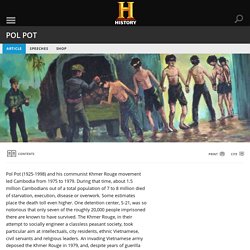
Former civil servants, doctors, teachers and other professionals were stripped of their possessions and forced to toil in the fields as part of a reeducation process. Those that complained about the work, concealed their rations or broke rules were usually tortured in a detention center, such as the infamous S-21, and then killed. The bones of people who died from malnutrition or inadequate healthcare also filled up mass graves across the country. Under Pol Pot, the state controlled all aspects of a person’s life. Money, private property, jewelry, gambling, most reading material and religion were outlawed; agriculture was collectivized; children were taken from their homes and forced into the military; and strict rules governing sexual relations, vocabulary and clothing were laid down.
At first, Pol Pot largely governed from behind the scenes. THE ROMAN EMPIRE - THE AGE OF AUGUSTUS. Why Does Haiti Suck? Part 2: Problems with Peoples. Why Does Haiti Suck? Part 1: Bloody Birth. Forced into Glory. Forced into Glory: Abraham Lincoln's White Dream (2000) is a book by Lerone Bennett, Jr., an African American scholar and historian, and executive editor of Ebony Magazine for decades.
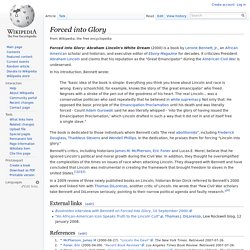
It criticizes President Abraham Lincoln and claims that his reputation as the "Great Emancipator" during the American Civil War is undeserved. In his introduction, Bennett wrote: The "basic idea of the book is simple: Everything you think you know about Lincoln and race is wrong. Every schoolchild, for example, knows the story of 'the great emancipator' who freed Negroes with a stroke of the pen out of the goodness of his heart. The real Lincoln... was a conservative politician who said repeatedly that he believed in white supremacy. The book is dedicated to those individuals whom Bennett calls "the real abolitionists", including Frederick Douglass, Thaddeus Stevens and Wendell Phillips. Bennett's critics, including historians James M. External links[edit] References[edit] Causes of the American Civil War. A common assumption to explain the cause of the American Civil War was that the North was no longer willing to tolerate slavery as being part of the fabric of US society and that the political power brokers in Washington were planning to abolish slavery throughout the Union.

Therefore for many people slavery is the key issue to explain the causes of the American Civil War. However, it is not as simple as this and slavery, while a major issue, was not the only issue that pushed American into the ‘Great American Tragedy’. By April 1861, slavery had become inextricably entwined with state rights, the power of the federal government over the states, the South’s ‘way of life’ etc. – all of which made a major contribution to the causes of the American Civil War. By 1860 America could not be seen as being a homogenous society. Clearly defined areas could be identified that had different outlooks and different values. 1932, A True History of the United States. Appian Way. The path of the Via Appia and of the Via Appia Traiana.
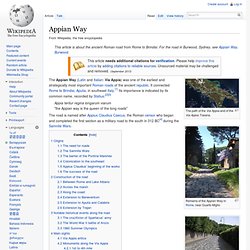
Remains of the Appian Way in Rome, near Quarto Miglio Near Rome. The Appian Way (Latin and Italian: Via Appia) was one of the earliest and strategically most important Roman roads of the ancient republic. It connected Rome to Brindisi, Apulia, in southeast Italy.[1] Its importance is indicated by its common name, recorded by Statius:[2][3] Appia teritur regina longarum viarum. Roman History. The greatest empire the earth has ever known is more than just a collection of facts and figures.
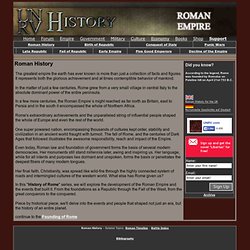
It represents both the glorious achievement and at times contemptible behavior of mankind. In the matter of just a few centuries, Rome grew from a very small village in central Italy to the absolute dominant power of the entire peninsula. In a few more centuries, the Roman Empire`s might reached as far north as Britain, east to Persia and in the south it encompassed the whole of Northern Africa. Rome's extraordinary achievements and the unparalleled string of influential people shaped the whole of Europe and even the rest of the world.
One super powered nation, encompassing thousands of cultures kept order, stability and civilization in an ancient world fraught with turmoil. Historia de Chile. La historia de Chile se divide generalmente en doce periodos que abarcan desde el comienzo del poblamiento humano del territorio del actual Chile hasta nuestros días.[1] El periodo prehispánico corresponde a la historia de las diferentes etnias amerindias presentes en el territorio, extendiéndose desde alrededor del año 14 800 a.
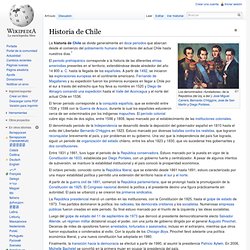
C. hasta la llegada de los españoles. A partir de 1492, se iniciaron las exploraciones europeas en el continente americano. Fernando de Magallanes y su expedición fueron los primeros europeos en llegar a Chile por el sur a través del estrecho que hoy lleva su nombre en 1520 y Diego de Almagro comandó una expedición hasta el Valle del Aconcagua y el norte del actual Chile en 1536. El tercer periodo corresponde a la conquista española, que se extendió entre 1536 y 1598 con la Guerra de Arauco, durante la cual los españoles estuvieron cerca de ser exterminados por los indígenas mapuches. Chile prehispánico[editar] Descubrimiento[editar] Dominación española[editar] Chile. Black Death. Roman Empire. Roman Empire.